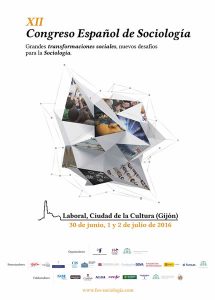The Gender and ICT team presented some of their research outcomes to the academic community in the XII Spanish Congress of Sociology, which was held in Gijón (Spain) from 30th June to 2nd July.
José Luis Martínez-Cantos addressed the evolution of the gender gaps in computer and Internet digital skills in Europe with a communication based on an analysis of the Community Survey on ICT usage in households and by individuals (Eurostat). The findings of his work show that the asymmetries between women and men regarding digital skills are slight on the most basic and widespread ones, but seem very significant in the more complex and specialized computer tasks. The gender and welfare state regimes, the segregation in labour market and education or the economic and productive models are the factors that can explain these patterns, which have been detected in most European countries.
Lidia Arroyo focused on the changes in the distribution of time in women’s daily life related to their digital inclusion. Arroyo presented a poster of her PhD project, a research based in a qualitative approach consisting of 30 interviews and 3 focus groups with adult women who started using the Internet 10 years ago.
The results show that women do not identify changes in relation to the distribution of tasks and the time uses in the domestic sphere among family members. However, the use of the Internet has motivated changes regarding women’s self-representation and their perception of their own abilities and the time of one’s own.
